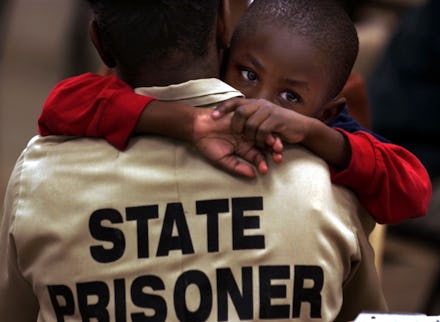This Mother’s Day, volunteers are paying to get moms out of jail with the #BlackMamaBailOut campaign

For the last 16 months, Amanda Leigh Lawson has organized volunteers to cover the cost of cash bail at New York’s jails for those awaiting trial. As the founder of the Dollar Bail Brigade, Lawson has a personal connection to her activism to end cash bail.
“My father was pretty absent throughout my childhood as a result of being incarcerated. I directly saw the instability that the prison system creates for black men,” Lawson said.
This month, thousands of contributors joined Lawson in the quest to free individuals being held on bail in jails — particularly black mothers. The Black Mama’s Bail Out campaign, in which ordinary citizens pay the cost of bail to get black moms out in time for Mother’s Day, is part of the ongoing, year-round National Bail Out collective, which includes groups across the country paying cash bail for all of those who can’t afford it, not just mothers.
Groups across the United States, including in Philadelphia, New York, Atlanta and Oakland, California, shared photos and stories on social media this weekend of their efforts to free women from jail in time to be reunited with their kids for the holiday.
Over the last 30 years, the American prison system has swelled to unprecedented levels; it now incarcerates over 2 million people. Yet, convicted criminals are only a part of the equation. The Prison Policy Initiative reports that 1 of every 5 people locked up is in a local jail awaiting trial — in other words, legally innocent.
In a country where 47 percent of people struggle to cover a $400 emergency, bail opponents argue the practice is a predatory industry that separates families who can’t afford to pay it. And poor families of color (40 percent of all people incarcerated are black, 19 percent are Latino) bear a disproportionate burden in the equation.
The Brooklyn Bail Fund, which is part of the national Black Mama’s Bail Out campaign, says defendants are nine times more likely to just plead guilty to misdemeanor charges to get out of jail when they can’t afford bail, as opposed to awaiting trial outside of jail.
Like Lawson, directly impacted families across the country are seeking change. Gina Clayton is the founder of the Essie Justice Group. The small organization is making national waves by cultivating the power of women whose lives are shaped by the imprisonment of their loved ones. For Clayton, the end goal of resisting cash bail is dismantling all incarceration in the United States.
“Bail reform holds the promise to end mass criminalization, giving people the opportunity to have a fair, truth-seeking process rather than one that is rigged to ensure every charged person ends up with a conviction,” Clayton said.
Clayton and her organization are one of many envisioning the end to cash bail as the starting point for a society that doesn’t cage its citizens or penalize their families.
In 2015, Essie contributed to a report published by the Ella Baker Center for Human Rights, Forward Together and Research Action Design, which found that 2 out of 3 families have difficulty meeting basic needs because of a loved one’s incarceration. Tash Nguyen, senior advocate at the Ella Baker Center, told Mic, “When you’re locked up, it’s your family and loved ones who are pooling their resources to get you out. They’re also bearing a huge bulk of the burden, putting up their homes, cars, credit to get you out.”
Between 1970 and 2014, the number of women incarcerated ballooned 14 times over. Nearly 80 percent of women inside are mothers. Clayton said that most single parents in jail are there as a result of a combination of “poverty, unemployment and significant physical or behavioral health struggles.”
“From the mental health, physical health impacts to the financial costs women with incarcerated loved ones bear, it is clear to both family members and those behind bars that it is not helpful to apply gradations to the suffering,” she said.
Bringing women, families and queer communities to the fore has been a successful strategy. This month, Lawson has freed 121 people from jail. In February, the Philadelphia City Council unanimously voted to end money bail as a means of pretrial detainment. Richmond, Virginia, prosecutors have made similar promises. These accomplishments have some looking toward the future. Nguyen says, “It’s an opportunity to shut down some cages, not just bring people home, but divert an entire generation from being in prisons. It’s not just about winning bail reform; it’s the day after.”